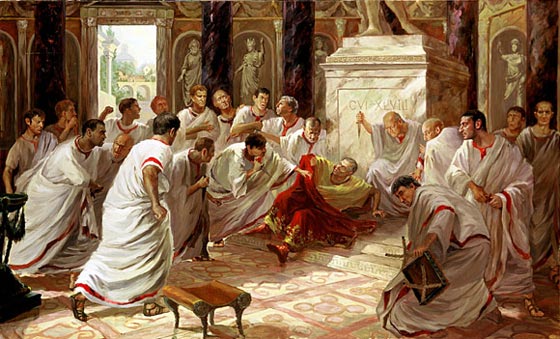
Further, he constructed a private palace on Quirinal Hill. This arrogance became increasingly more evident as time passed: he sat attired in the purple regalia of the ancient Roman kings on a specially built golden chair while attending the Senate, often refusing to rise out of respect to any member who approached him. In all processions, an ivory statue of Caesar was to be carried alongside the statues of the Roman gods - and all this was done without objection from Caesar. One tribune Pontus Aquila even refused to rise as Caesar passed - something that angered the conquering hero.ĭespite the feelings of some, numerous honors were given him: he was awarded the titles of liberator and imperator his birthday was made a public holiday his birth month, Quinctilis, was renamed in his honor – Julius (July) and lastly, he was named both the father of his country as well as a consul for ten years. Wars in the east had been against foreigners, but his victory in Spain saw the deaths of what many considered as their own sons and daughters. Adorned in triumphant garments and a laurel crown - something many people saw as unnecessary - Caesar rode into the city. This arrogance was most evident upon his victorious return to the city after the defeat of fellow Roman commander Gnaeus Pompey in Spain. Caesar's extreme arrogance and vanity (he was very self-conscious about his balding head, for example) offended many in the Roman Senate. They believed they no longer had a voice as Rome was quickly coming under the control of a would-be tyrant. To these men, their beloved republic no longer existed, especially after Caesar was named dictator for life in February 44 BCE - a completely unconstitutional act. While these reforms made him popular among the commoners, they brought panic to many of his enemies and even some of his friends.

Caesar not only provided jobs through public work projects but also cleaned up the dangerous city streets.

The city of Rome had suffered violence and corruption and was plagued by high unemployment. He created a new calendar (still in use today) and provided both gladiatorial games and banquets as entertainment. He limited the terms of the provincial governors while increasing the size of the Senate. Next, he gave grain to the urban poor and planned to move these same poor to the newly acquired colonies in Anatolia, Greece, and North Africa.

Always loyal to his army, one of his first endeavors was to offer land to seasoned veterans. Seeing the need and demonstrating that he truly loved the people of Rome, he decreed a number of significant and necessary reforms - reforms that further endeared him to the Roman citizenry. The man who was soon to be hailed as dictator for life ( dictator perpetuo) transferred his skill as a military commander into the ability to lead the Republic. Although loved by the citizens of Rome, he caused, in many ways, worry among those in the Roman Senate - especially the old elite, the Optimates. During his time as a Roman general, he claimed to have killed almost two million people in fifty decisive battles. Gaius Julius Caesar had returned to Rome in triumph, hailed as a hero. Vincenzo Cammuccini (Public Domain) Military Success & Reforms


 0 kommentar(er)
0 kommentar(er)
